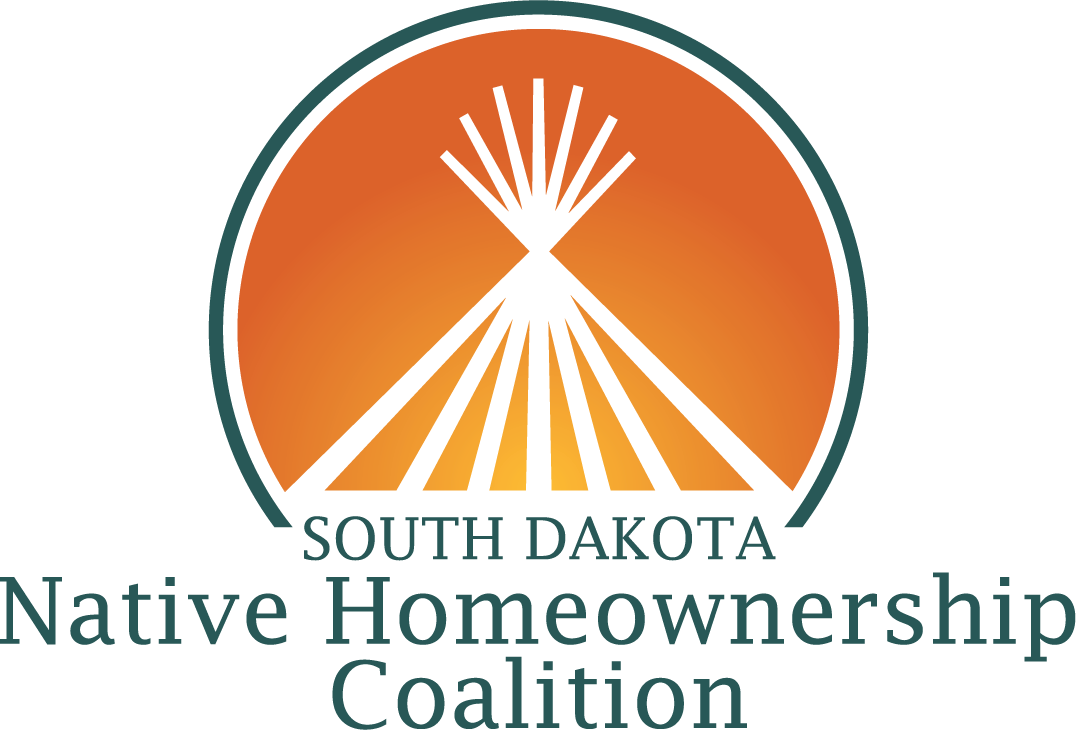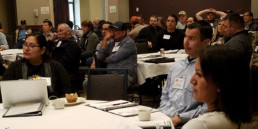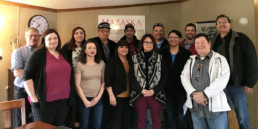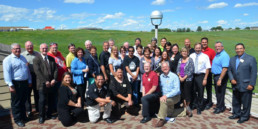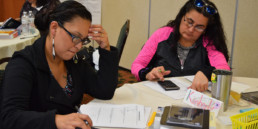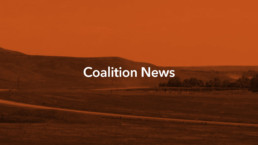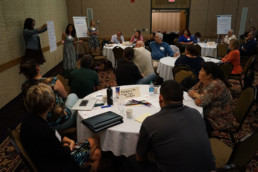Coalition Members Head to Washington to Advocate for Native Homeownership
Earlier this month, representatives of the Coalition’s Policy Committee traveled to Washington, DC to advocate for policies to promote Native homeownership in conjunction with the National American Indian Housing Council (NAIHC) Legislative Conference. While in DC, the delegation held meetings with representatives from US Department of Housing and Urban Development, US Department of Agriculture, and US Department of Veterans Affairs (VA). The delegation discussed the proposed 502 relending demonstration (where Native CDFIs would relend 502 funds to qualified borrowers) as well the HUD 184 guaranteed loan product and strategies to increase the number of Native American Direct Loans (NADL) originated by the VA. The delegation also meet with the North Dakota and South Dakota Senators, and Senate Committee on Indian Affairs staff.
Featured in image: Members of the SD Native Homeownership Coalition met with Senator John Thune (R-SD) to discussion Native homeownership. From left to right, Mark Witt, Rosebud Tribal Veteran Service Officer (TVSO); Robert Dunsmore, Cheyenne River Sioux Tribe TVSO; Darrel Hernandez, Oglala Sioux Tribe TVSO; Senator John Thune; JC Crawford, Executive Director, Sisseton Wahpeton Housing Authority; and Joanna Donohoe, Co-Facilitator, SDNHOC.
Coalition Working on Multiple Fronts to Support Native Construction Industry
Recognizing that the lack of housing stock is a real barrier to homeownership in Native communities, the Coalition is working hard to support local contractors and encourage them to build more homes. We are excited about developing the following programming to support our Native construction industry:
Construction Internship Pilot Program – Summer 2017
After hearing from contractors that finding employment-ready workers is a challenge, in summer 2017, the Coalition launched a pilot internship program to place building trades students from Oglala Lakota College with local contractors. Through the program, students on the Pine Ridge and Cheyenne River Reservations gained valuable hands-on construction experience, while contractors had the chance to test out potential employees in a risk-free setting. The program was managed by our Native CDFI partners – Four Bands Community Fund on Cheyenne River and Lakota Funds on Pine Ridge – who also provided financial education classes to participants. Based on input from interns, contractors, and partners, the program was a huge success; of the 11 students who completed the internship, 9 received job offers from their contractors.
Building on this success, we plan to expand to additional tribal communities in summer 2018. To learn more about the construction internship program, click below to download your copy of the program report.
Contractor Workshop – Jan 31, 2018 – Rapid City
In January 2018, the Coalition’s Veterans Committee organized a one-day workshop for contractors focused on how to work with loan products available for building on trust land. With over 65 participants and contractors from around the state, the workshop was very well attended, and feedback was overwhelmingly positive.
According to one contractor:
“It was a great turnout. A lot of beneficial information provided and networking.”
The day’s agenda included contractor and lender perspectives on working with the HUD 184 loan, information on the VA’s Native American Direct Loan (NADL) and USDA’s 502 loan, resources provided by Native CDFIs, and recognition of the summer 2017 interns and contractors.
Inspector Certification Training – February 27-March 2, 2018 – Rapid City
Understanding that the shortage of certified building inspectors can delay the construction process, the Coalition is also working to increase the number of certified inspectors working in tribal communities. Our goal is to have at least one certified inspector on each reservation in South Dakota. This winter, we held an intensive four-day training to prepare participants for the inspector certification exam, with the actual exam administered on the fourth day of the training. Thirty-one participants attended the training, a combination of independent contractors and housing authority staff. The training was conducted by the International Code Council (ICC), who sent their top instructors to work with our Coalition participants. Feedback about the training was extremely positive; in the words of one participant, “the training was extremely helpful and I appreciate the opportunity to participate.” Another participant stated, “I liked the training – best one I have been at.” Recognizing the value of building codes in providing safety standards, a number of participants have requested support to promote the adoption of building codes in their tribal communities.
Coalition Members Develop Innovative Approach to Increase Native Veteran Homeownership
Two Coalition members, Mazaska Owecaso Otipi Financial (Mazaska) and Lakota Funds, have teamed up to increase homeownership rates for Native American veterans through an innovative new approach that simplifies the path to homeownership. In late February, both organizations were present to support George O’Rourke and Darrel Hernandez as they closed their VA Native American Direct Loans (NADL) and took the final steps toward homeownership on the Pine Ridge Reservation.
Colleen Steele, Executive Director of Mazaska, explains the new approach was born out of listening sessions that were hosted by the Coalition. Through the listening sessions, she heard the stories of several Native American veterans and gained a solid understanding of the barriers they face in achieving homeownership.
“Some of the veterans we talked to had been trying to access mortgage products designed specifically for veterans for more than two years, and we realized that Mazaska could make things a lot easier for them,” says Steele.
Through the new model, Mazaska provides a construction loan to the veteran and then helps them refinance with the Veterans Affairs Native American Direct Loan once the home is constructed. Mazaska also provides homebuyer education and assistance throughout the loan process. Especially during the complex refinance, Mazaska and Lakota Funds work together to provide intensive support to the homebuyer and coordinate with the U.S. Department of Veterans Affairs to keep things moving forward.
George O’Rourke comments on his experience, “The Mazaska program helped make refinancing my home with the Native American Direct Loan a simple quick process. I would like to thank Veterans Affairs for working with Mazaska to create this opportunity for future veterans.”
“It was a long time coming,” says Darrell Hernandez. “I really appreciate the help I received from Mazaska to get the loan finalized so that my family could move into our new home. I am more committed than ever to work with the U.S. Department of Veterans Affairs to streamline the Native American Direct Loan process so that other Native veterans won’t have to wait so long.”
“Our Native American veterans have sacrificed a lot by serving our country. We are glad to serve them as they pursue their homeownership dreams,” says Steele.
Coming Soon: Membership Dues
Moving Towards Sustainability
Our Coalition is Launching Membership Dues!
Over the past three years, our Coalition has been discussing strategies to sustain our operations by diversifying our sources of revenue. To date, we’ve enjoyed terrific support from our funders on the local, state, and national levels.
Last fall at our Coalition planning meeting, we created an ad hoc membership committee to explore these issues more formally. The committee met several times to discuss and develop a membership dues strategy. After approval by the executive committee, the new membership benefits and dues structure is nearly final. We will be rolling out our new membership structure in the coming weeks.
We are excited to enter this new phase of growth of the Coalition. We have heard from many stakeholders how beneficial the Coalition’s activities have been to your operations. We look forward to continuing to collaborate with partners who share our mission to increase homeownership opportunities for South Dakota’s Native people to build strong and healthy communities.
Exciting Homebuyer Education Trainings on the Horizon
Based on the input of Committee members, the Coalition’s Homebuyer Readiness Committee is planning two exciting trainings this spring to support homebuyer practitioners working to teach and support new homebuyers in their communities. We invite you to participate in these classes! Registration information will be coming soon.
Designing and Strengthening Your Homebuyer Education Program
Many of our practitioners have attended financial education and homebuyer instructor trainings and are very familiar with different training curriculums. This training will go a step further – looking at how to design a homebuyer education program, or strengthen an existing program. Discussion will include:
- What should agendas cover?
- What activities can should be included?
- How should training modules be structured?
Through this training, participants will have an opportunity to:
- Engage in hands-on activities to expand and practice their facilitation skills
- Learn and test new interactive training activities
- Create participants’ and trainers’ agendas
- Develop pre- and post- training checklists
- Learn new concepts related to adult education methodology
The training will provide valuable opportunities for peer sharing and discussions, and time to for participants to enhance and strengthen their new and their existing financial and homebuyer education programs.
Creating a Healthy Home
Homeownership means more than budgets and monthly payments. Homebuyer educators can also share important information about home maintenance and creating a healthy home environment. In this class, we will look at practical energy-saving tips, how to make non-toxic, healthy cleaning products with readily-available materials, and how healthy homes contribute to healthy communities. We will also spend time looking at local, native plants and their uses.
Coalition Members Learn How to Integrate Coaching into Homebuyer Readiness Programs
In November, 17 practitioners in the Native homeownership field completed a three-day training where they learned about new financial coaching methods to integrate into their programs. The training, hosted by the Coalition and co-facilitated by CNM Ingenuity and Seven Sisters Community Development Group, focused on a coaching model that is designed to empower clients. Different from the traditional case management model where practitioners advise clients, coaching asks powerful questions so that the client can identify their own goals and create their own path to attain those goals.
“This approach reminds me of how our elders talk to us. They allow silence and reflection so you know what you need to do,” says Vickie Oldman John of Seven Sisters who helped facilitate the training.
Training participants learned how to avoid reacting to crises along with several important components of coaching, such as whole body listening and personal self-talk. They also participated in several interactive exercises where they were able to put their new skills to the test.
“Learning the tools to be a financial coach has been an exciting process. It forces you to think outside the box to come up with creative questions,” says Kimberly Claymore from Cheyenne River Housing Authority.
The training also included a segment on how to integrate the coaching model into an organizational culture. This segment allowed participants to brainstorm ideas and develop plans on how to use this new method in their work with clients.
“Financial coaching is something I’ve been interested in since I began my job as an Individual Development Account coach. I plan to put my financial coaching training to immediate use,” said Elaine MatoTama Hece from the Oglala Sioux Tribe Partnership for Housing on Pine Ridge.
The financial coaching training was inspired out of a need expressed by the Coalition’s Homebuyer Readiness Committee who established it as a milestone to complete in 2017. All training participants received text book and a financial calculator.
Tribal Leaders Support Coalition’s Policy Recommendations
At its December meeting, the Great Plains Tribal Chairmen’s Association adopted two resolutions in support of the South Dakota Native Homeownership Coaltion’s policy recommendations to federal policymakers.
The first resolution supported legislative amendments to the US Department of Veterans Affairs Native American Direct Loan (NADL) program to improve homeownership opportunities for Native veterans on Indian reservations in South Dakota.
The second resolution supported other broader homeownership recommendations including:
- Support for the implementation of the USDA Rural Development 502 home loan relending pilot
- Funding for the Bureau of Indian Affairs Housing Improvement Program
- Improvements to the HUD Section 184 loan guarantee program to increase deployment on trust land
- Exploring new partnerships with Fannie Mae and Freddie Mac as part of their Duty to Serve implementation plans
The Coalition appreciates the support of Cheyenne River Sioux Tribe Chairman Harold Frazier, who introduced the resolutions. We look forward to continuing to collaborate with the Great Plains Tribal Chairmen’s Association and South Dakota’s tribal leadership and Tribal Veteran Service Officers to promote these policy changes.
Coalition to Launch Round II of Housing Needs Studies
With support from the South Dakota Housing Development Authority, the South Dakota Native Homeownership Coalition (Coalition) will be facilitating housing needs studies (studies) in two small tribal communities in South Dakota. Under the program guidelines, eligible tribal communities must have a population of 10,000 or less. The size of the community/reservation will determine whether one specific community or the broader reservation is assessed. Work to conduct these studies will start by January 1, 2018, and studies will be completed by June 30, 2018.
These studies will play an important role in effective planning for future housing efforts. The study for each community will include the following data elements: existing housing stock, housing issues, homeownership information, information on housing providers and programs, potential barriers to homeownership, demographics, economics, and recommendations.
In facilitating these housing needs studies, the Coalition will identify two tribal communities to be assessed (through an application – see link below). The Coalition will contract with Big Water Consulting, an experienced firm which has conducted prior studies, to carry out the assessments. Big Water Consulting will work closely with the communities to be assessed, and the sponsoring tribal organization must designate at least one staff member to assist the firm in conducting the assessment. It is critical that the sponsoring community dedicate sufficient time and attention to working with Big Water Consulting.
The total budget for each study will not exceed $20,000 per study. Support from the Coalition (provided by the South Dakota Housing Development Authority) will cover 50% of the cost of each study, for a maximum of $10,000 per study. Each selected community will be required to pay a cash match to cover the other half of the cost of its study (up to $10,000). There are no restrictions on the source of match funds; however, match funds must be provided in cash by January 1, 2018. Applicants will be asked to indicate potential sources of match as part of the application process.
Submitting Applications
To apply to participate in the housing needs study, interested communities should complete the following application. Applicants will be evaluated based on current homeownership efforts, involvement in the Coalition, plans to use information collected through the assessment, and ability to provide matching funds.
The application package should contain:
- Completed application form (signed)
- Scanned copy of governing body minutes or resolution authorizing application
Applications should be submitted by November 30, 2017 per the instructions in the application package.
Coalition Continues Growing and Developing
On September 11-13, 2017, over 60 members of the South Dakota Native Homeownership Coalition gathered for our annual planning session and other activities held in conjunction with the South Dakota Housing Development Authority’s Annual Housing Conference in Pierre, South Dakota. The series of events provided a platform for our continued growth and development, as well as peer sharing and networking opportunities.
Coalition Planning Day – September 11, 2017
Attendees of our fourth annual planning day represented our diverse membership, and included Native and non-Native nonprofit organizations, Tribally Designated Housing Entities (TDHEs), tribal departments, federal agencies, state agencies, lenders, and Community Development Financial Institutions (CDFIs).
The day’s full agenda included:
Preview of the Coalition’s “Native Homeownership is Possible” video series
Coalition members had the opportunity to view and provide their feedback on the first two of a series of videos that the Coalition is developing to promote the message that “Native Homeownersip is Possible.” Members’ feedback was very positive about the videos, which are being produced by David Cournoyer of Plain Depth Consulting and Jay Fishback of Northern Voyage Productions. After watching the videos, Coalition members also shared suggestions bout how to launch the videos and what additional materials should accompany them.
Exploration of strategies to promote the Coalition’s long-term sustainability
Recognizing the importance of going beyond foundation support and diversify funding sources, Coalition members explored different potential income generating strategies, including:
- Membership dues
- Registration fees
- Holding a homeownership development summit
- Producing a post-purchase curriculum
- Reaching out to tribes for support
- Creating a development corporation
Information sharing on the appraiser apprenticeship process
Brian Gatzke, an appraiser out of Brookings, SD, shared information about the appraiser apprenticeship process and requirements for certification. Coalition members are excited to work with Brian and other partners to support appraiser candidates, and have formed a special subcommittee of the Physical Issues Committee to focus on this issue. Next steps for this subcommittee include working to identify potential appraisal apprentice candidates and supervisors.
Information sharing on Enterprise Community Partners’ VISTA Program
Enterprise Program Director Vince Gallagher shared information about this program, which can place VISTA volunteers at Coalition member organizations. Please stay tuned for a webinar with more information on program guidelines, what VISTA volunteers can do, and how to request a VISTA volunteer at your organization.
In-person Coalition committee meetings
During the planning session, Coalition members had a chance to hold in-person committee meetings to review progress over the past year, and set 2018 milestones. Select milestones that committees will be focusing on include:
| Committee | Select Milestones |
| Homebuyer Readiness |
|
| Funding and Finance |
|
| Physical Issues |
|
| Veterans |
|
| Policy |
|
Native Homeownership Conference Track – September 12-13, 2017
This year, the Coalition planned and provided the conference’s Native Homeownership Track, with the following workshops:
- Paths to Homeownership for Native Veterans
- Estate Planning for Homeowners
- Sustainable Homeownership Development on Crow Creek
- Beyond Housing: Building Neighborhood Communities
- Preparing a Construction Workforce: the Coalition’s Construction Internship
Featuring topics that are relevant to Coalition members and providing a valuable opportunity to share the work of the Coalition, the workshops were well-attended, generating productive discussions and positive feedback.
Additional Gatherings
This year, the Coalition also facilitated a number of additional gatherings in conjunction with the SDHDA conference:
- Breakfast to explore increased lender participation in the Federal Home Loan Bank’s Native American Homeownership Initiative (NAHI)
- Homebuyer practitioner gathering focused on data collection
- Post-conference debriefing session
At the post-conference debriefing session, participants shared what they were most excited about the conference and the coming year. Responses included:
- Starting to focus on estate planning, wills and successorship
- Veterans’ programming and the CDFI/NADL model
- Appraiser initiative
- Looking at community engagement
- Focusing on the 502 re-lending pilot program
Please share your input about the Coalition!
We are seeking feedback from all stakeholders about how valuable the Coalition is to you and your organization. Please click on the link below to complete a brief survey by Friday, September 1, 2017.
Chance for FREE Conference Registration!
All survey respondents who complete the survey by 5 pm MT on September 1 will be entered into a drawing to win a free registration to the annual South Dakota Housing Conference on September 11 – 13, 2017. A $200 value!
Thank you for sharing your perspective! We will share results at the Coalition’s planning meeting on September 11, 2017 in Pierre.
